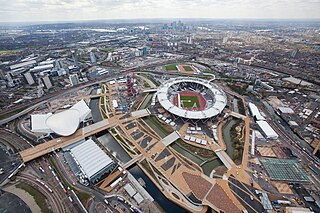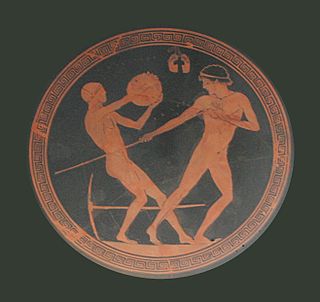
The Summer Olympic Games, also known as the Games of the Olympiad, is a major international multi-sport event normally held once every four years. The inaugural Games took place in 1896 in Athens, Greece, and the 2024 Summer Olympics was held in 2024 in Paris, France. This was the first international multi-sport event of its kind, organized by the International Olympic Committee (IOC) founded by Pierre de Coubertin. The tradition of awarding medals began in 1904; in each Olympic event, gold medals are awarded for first place, silver medals for second place, and bronze medals for third place. The Winter Olympic Games were created out of the success of the Summer Olympic Games, which are regarded as the largest and most prestigious multi-sport international event in the world.

Track cycling is a bicycle racing sport usually held on specially built banked tracks or velodromes using purpose-designed track bicycles.

The Winter Olympic Games is a major international multi-sport event held once every four years for sports practiced on snow and ice. The first Winter Olympic Games, the 1924 Winter Olympics, were held in Chamonix, France. The modern Olympic Games were inspired by the ancient Olympic Games, which were held in Olympia, Greece, from 776 BCE to 394 CE. The Baron Pierre de Coubertin of France founded the International Olympic Committee (IOC) 1,500 years later in 1894, leading to the first modern Summer Olympic Games in Athens, Greece in 1896. The IOC is the governing body of the Olympic Movement, with the Olympic Charter defining its structure and authority. The original five Winter Olympic Sports were bobsleigh, curling, ice hockey, Nordic skiing, and skating. The Games were held every four years from 1924 to 1936, interrupted in 1940 and 1944 by World War II, and resumed in 1948. Until 1992, the Summer Olympic Games and the Winter Olympic Games were held in the same year. A decision to change this was made in 1986, when during the 91st International Olympic Committee session, IOC members decided to alternate the Summer Olympic Games and the Winter Olympic Games on separate four-year cycles in even-numbered years. Also, at that same congress it was decided that 1992 Winter Olympics would be the last to be held in the same year as the Summer Games and that to change the rotation, the games that would be held in 1996 would be brought forward by two years, being scheduled to 1994. After those games, the next were to be held in 1998 when the four-year Olympic Cycle resumed.

The Commonwealth Games is a quadrennial international multi-sport event among athletes from the Commonwealth of Nations, which consists mostly, but not exclusively, of territories of the former British Empire. The event was first held in 1930 as the British Empire Games and, with the exception of 1942 and 1946, has successively run every four years since. The event was called the British Empire Games from 1930 to 1950, the British Empire and Commonwealth Games from 1954 to 1966, and the British Commonwealth Games from 1970 to 1974. The event removed the word British from its title for the 1978 Games and has maintained its current name ever since.

The Asian Games, also known as Asiad, is a continental multi-sport event held every fourth year among athletes from all over Asia. The Games were regulated by the Asian Games Federation (AGF) from the first Games in New Delhi, India in 1951, until the 1978 Games. Since the 1982 Games, they have been organized by the Olympic Council of Asia (OCA), after the breakup of the Asian Games Federation. The Games are recognized by the International Olympic Committee (IOC) and are described as the second largest multi-sport event after the Olympic Games.

Athletics is a group of sporting events that involves competitive running, jumping, throwing, and walking. The most common types of athletics competitions are track and field, road running, cross-country running, and racewalking.

The 1896 Summer Olympics, officially known as the Games of the I Olympiad and commonly known as Athens 1896, were the first international Olympic Games held in modern history. Organised by the International Olympic Committee (IOC), which had been created by French aristocrat Pierre de Coubertin, the event was held in Athens, Greece, from 6 to 15 April 1896.

A multi-sport event is an organized sporting event, often held over multiple days, featuring competition in many different sports among organized teams of athletes from (mostly) nation-states. The first major, modern, multi-sport event of international significance was the Olympic Games, first held in modern times in 1896 in Athens, Greece, and inspired by the Ancient Olympic Games, one of a number of such events held in antiquity. Most modern multi-sport events have the same basic structure. Games are held over the course of several days in and around a "host city", which changes for each competition. Countries send national teams to each competition, consisting of individual athletes and teams that compete in a wide variety of sports. Athletes or teams are awarded gold, silver or bronze medals for first, second and third place respectively. Each game is generally held every four years, though some are annual competitions.

The 1952 Summer Olympics, officially known as the Games of the XV Olympiad, and commonly known as Helsinki 1952 were an international multi-sport event held from 19 July to 3 August 1952 in Helsinki, Finland.

The 1924 Summer Olympics, officially the Games of the VIII Olympiad and officially branded as Paris 1924, were an international multi-sport event held in Paris, France. The opening ceremony was held on 5 July, but some competitions had already started on 4 May. The Games were the second to be hosted by Paris, making it the first city to host the Olympics twice.

Athletics is a sport that includes athletic contests based on running, jumping, and throwing skills. The name used in North America is derived from where the sport takes place, a running track and a grass field for the throwing and some of the jumping events. Track and field is categorized under the umbrella sport of athletics, which also includes road running, cross country running and racewalking. In British English the term athletics is synonymous with American track and field and includes all jumping events. Outside of Canada and the United States, athletics is the official term for this sport with 'track' and 'field' events being subgroups of athletics events.

The World Athletics Championships, known as the IAAF World Championships in Athletics until 2019, are a biennial athletics competition organized by World Athletics, formerly International Association of Athletics Federations (IAAF). Alongside Olympic Games, they represent the highest level championships of senior international outdoor athletics competition for track and field athletics globally, including marathon running and race walking. Separate World Championships are held by World Athletics for certain other outdoor events, including cross-country running and half-marathon, as well as indoor and age-group championships.

A pentathlon is a contest featuring five events. The name is derived from Greek: combining the words pente (five) and -athlon (competition). The first pentathlon was documented in Ancient Greece and was part of the Ancient Olympic Games. Five events were contested over one day for the Ancient Olympic pentathlon, starting with the long jump, javelin throwing, and discus throwing, followed by the stadion and wrestling. Pentathletes were considered to be among the most skilled athletes, and their training was often part of military service—each of the five events in the pentathlon was thought to be useful in war or battle.

The Pan American Games is a continental multi-sport event in the Americas featuring summer sports, in which thousands of athletes participate in a variety of competitions. The competition is held among athletes from nations of the Americas, every four years in the year before the Summer Olympic Games. It is the second oldest continental games in the world. The only Winter Pan American Games were held in 1990. In 2021, the Junior Pan American Games was held for the first time specifically for young athletes. The Pan American Sports Organization (PASO) is the governing body of the Pan American Games movement, whose structure and actions are defined by the Olympic Charter.

Swimming has been a sport at every modern Summer Olympics. It has been open to women since 1912. At the Olympics, swimming has the second-highest number of medal-contested events.
A privately held company is a company whose shares and related rights or obligations are not offered for public subscription or publicly negotiated in their respective listed markets. Instead, the company's stock is offered, owned, traded or exchanged privately, also known as "over-the-counter". Related terms are unlisted company, unquoted company and private equity.

Athletics has been contested at every Summer Olympics since the birth of the modern Olympic movement at the 1896 Summer Olympics. The athletics program traces its earliest roots to events used in the ancient Greek Olympics. The modern program includes track and field events, road running events, and race walking events. Cross country running was also on the program in earlier editions but it was dropped after the 1924 Summer Olympics.

The Filmfare Awards South are annual awards that honour artistic and technical excellence in the Telugu cinema, Tamil cinema, Malayalam cinema and Kannada cinema. They are presented by Filmfare magazine of The Times Group. When it was introduced in 1954, the Filmfare Awards initially only recognized achievements in the Hindi cinema. In 1964 the awards were extended to Telugu, Tamil, Bengali and Marathi languages. Malayalam cinema was included in the awards in 1967 and Kannada cinema followed in 1970.
















